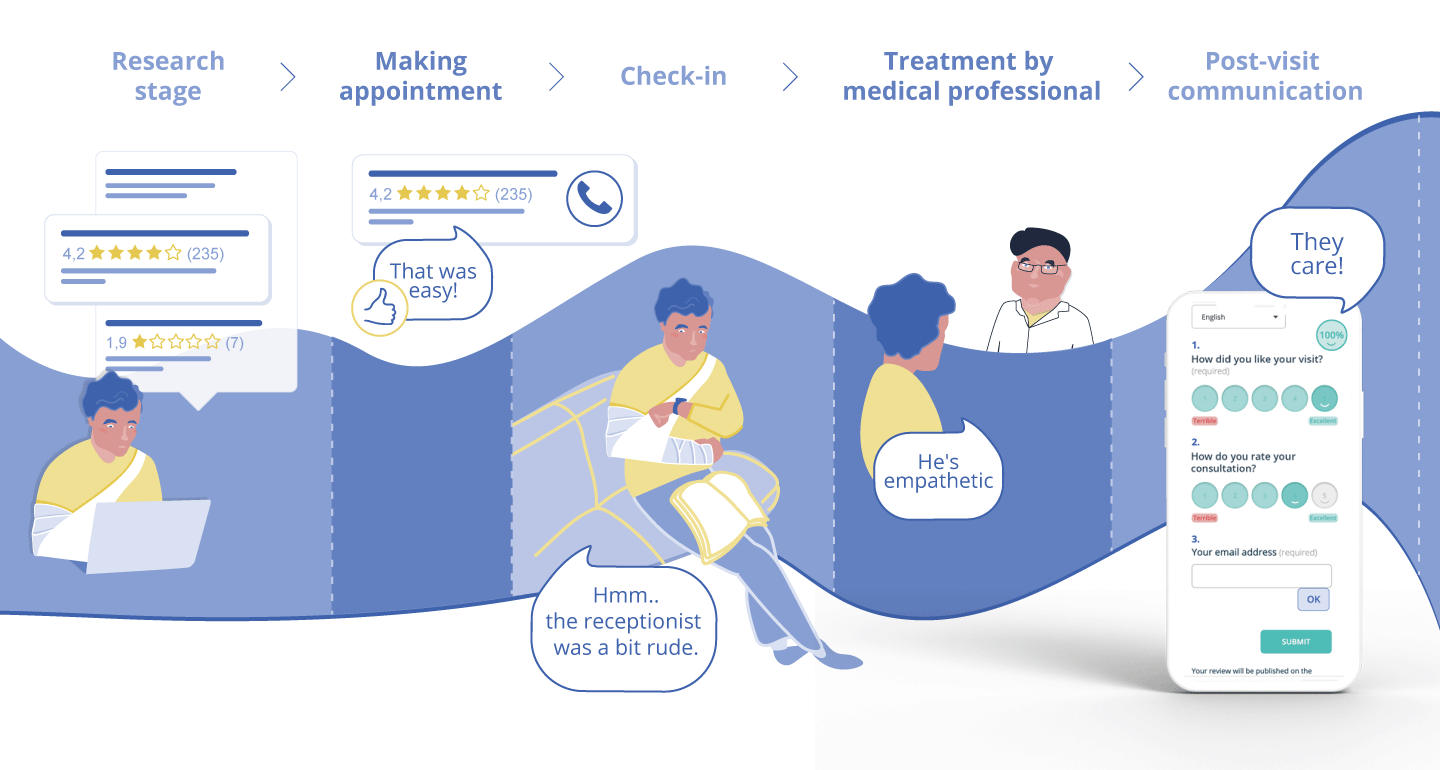Modern healthcare providers don’t guess about how satisfied their patients are, they know. They rely on data collected from a patient satisfaction questionnaire to give them actionable insights.
But wait,
What is patient satisfaction?
Going beyond effective treatment, patient satisfaction measures the contentment of patients’ overall experience with a healthcare provider. Think pre-visit emails, time with staff, waiting room wait and even post-visit communication. Several factors comprise this satisfaction as we’ll discuss below.
Patient satisfaction matters because:
1 satisfied patient has the power to reach 4 potential patients while 1 dissatisfied patient can negatively affect 10 potential patients (1).
Huge right? So, let’s dive in!
Why doctors’ offices, clinics, and hospitals should invest in patient satisfaction
As the healthcare industry shifts to become more patient-centred, it is essential individual clinics and hospitals stay up to date by focusing on patient satisfaction. For instance, consider the following reasons:
Gain patient loyalty
Patient expectations are higher now. Moreover, they demand excellent care AND service. They won’t come back unless they feel they’ve been taken care of throughout their entire interaction with your practice or hospital. When your organisation consistently makes efforts to elevate the patient experience, patients will notice and their loyalty will increase!
For example, when they receive patient satisfaction survey questions post visit, they feel like their opinion matters. It’s another way of continuing the conversation outside of the doctor’s office and showing empathy.
Attract new patients with satisfied ones
Happy (and yes, unhappy) patients now leave their feedback online for the entire world to see.
Almost 60% of patients indicate that they’ve chosen a doctor because of the doctor’s positive reviews and also the same percentage said they’ve not selected a doctor due to their negative reviews (2).
When you initiate the feedback process and provide patients with a patient satisfaction questionnaire, this can be useful to your online reputation in 3 ways. You can:
- Discover a negative experience and attempt to resolve the patient’s issue before they go online with their feedback.
- Build your online reputation by inviting patients to leave their feedback on prominent platforms like Google. (Hello Google star ranking!)
- Showcase excellent feedback directly on your website to encourage potential patients to book an appointment with your healthcare organisation.
Internal improvements
Create an ever-evolving workplace culture. See trends mentioned in the patient satisfaction questionnaire to get insights on areas for improvement. After that, discuss results with staff and brainstorm points of action based on feedback. Certainly, measuring customer satisfaction in healthcare has never been more important and should involve everyone.
Bonus: We also recommend using internal surveys to check in with your staff and advance employee retention. Subsequently check out our Customer Satisfaction Guide for businesses for a complete overview.
[ca-form id=”44600″ align=”right”]
Which patient satisfaction factors should my organisation care about?
Tricky question as the answer is—you’ll never truly know til you ask your patients themselves!
The best way to understand which factors matter most to your patients is to analyse the patient journey. As the patient journey (and therefore factors) vary by healthcare providers, it’s important that your organisation consider its own, unique patient journey.
Meanwhile, let’s use this patient journey as a general guide.

Advanced communication
As the patient journey illustrates, the patient interacts with your hospital or clinic long before they show up for their appointment and also after they leave.
Ideal communication looks like:
- Pre-visit emails with relevant appointment information
- Appointment text reminders
- Excellent onsite communication with staff and physicians
- Follow-up emails post-visit
- Post-visit survey via email or text
Make sure your organization is equipped with tools to enrich the patient journey, showing them they matter at every touchpoint.
Online reputation
77% of us utilise online reviews as the first step in finding a new physician (3).
So, don’t underestimate the potential reach of your online reputation. Google rankings and reviews matter not only in the research stage, but also post-visit. If your organisation addresses each review, patient satisfaction increases and potential patients note that you care.
And don’t forget to professionally take care of negative feedback as studies show that when you do, patient satisfaction doubles (4).
In addition to a patient satisfaction questionnaire, your healthcare organisation can study reviews to discover areas of improvement indicated by your patients. We call it listening to the voice of the customer (patient, in this case). For more info, see The Voice of the Customer Guide: Importance, VoC tools and examples.

Atmosphere
The patient experience is relevant to their level of satisfaction. As you consider which patient satisfaction factors to include in your patient satisfaction survey, think about whether or not your organisation offers:
- Clear explanations in all interactions
- A calm waiting room
- Average waiting room time
- Great teamwork among staff
- Use of empathetic language
- Active listening by doctor
For example, in a study, 75% of orthopedic surgeons assumed that they were excellent communicators while only 21% of their patients thought so (5). Don’t assume your organisation is excelling in all of the above. Ask your patients. They’ll tell you (we promise).
How to increase patient satisfaction
Convinced it’s time to focus on patient satisfaction? So…act!
Make it a priority
Make a case to the decision-makers of your organisation for investing in patient satisfaction.
In addition to the stats above, inform them that 43% of healthcare organizations are losing more than 10% of revenue as patients decide to go elsewhere (6).
Determine a strategy to establish patient satisfaction importance.
Go digital
Next, select a leading SaaS platform to help your organisation improve quality care. It’s much easier to collect, manage and analyse patient feedback on a digital platform.
For example, you can utilise this technology to send automated emails and text messages throughout the patient journey. In other words, getting responses to your healthcare customer satisfaction survey questions doesn’t have to be hard.
A patient satisfaction platform should help your organisation to:
- Collect and send reviews to Google
- Customise your own patient satisfaction survey questionnaire
- Display reviews directly on your website to build trust
- Easily respond to reviews from one place
- Understand the sentiment within reviews
- Segment your patients
- Offer advanced communication across the patient journey
(P.S. At Customer Alliance we’ve a scalable patient satisfaction platform that can be utilised by both small practices and large hospitals.)
Evolve based on feedback
Set targets, measure progress, evolve. Repeat.
7 out of 10 patients who provide feedback expect organisational improvements (2).
In short, don’t disappoint them.
Learn what your strengths are and how to maximise them to your organisation’s advantage with healthcare customer satisfaction survey questions. But also discover what areas your patients would like to be improved and make it happen. What is patient satisfaction survey but an opportunity to improve?
Remember though, this can only happen with everyone’s involvement—doctors, staff, and admin. Set regular meetings to discuss patient feedback and points of action. We recommend implementing and tracking your organisation’s Net Promoter Score (NPS).Then, you’ll be able to see and more importantly, prove, that your efforts have had an impact over time.
Sources:
- SolutionReach Blog: 10 Surprising stats on patient satisfaction
- NRC Health. Patients trust online reviews as much as doctor recommendations—and other shocking facts about transparency in healthcare
- PatientPop. How the Internet Changed the Way New Patients Find a Physician
- PatientPop. The Patient Perspective 2019: Online Reputation Survey
- Tongue J. R., Epps H. R., Forese L. L. Communication skills for patient-centered care: research-based, easily learned techniques for medical interviews that benefit orthopaedic surgeons and their patients. J Bone Joint Surg Am. 2005;87:652–658
- Fibroblast. Patient Leakage: A new survey highlights high costs, limited control.
